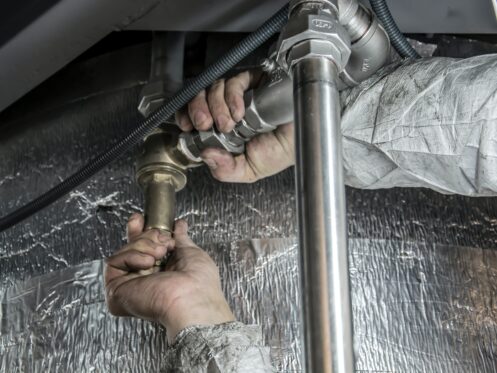Gas line leaks are one of the most serious issues you can deal with as a homeowner. Any time there is even a minor gas leak, it creates a huge risk of a catastrophic fire or even your home exploding. This is why it’s essential that all of your home’s gas piping is protected and safe to use. It’s also important that you know how to detect the signs of a gas leak and that you know exactly what to do any time you suspect a leak.
Ensure All Exposed Gas Lines Are Protected and Properly Supported
The location of the indoor and outdoor gas lines is different for every home. Most gas lines are hidden behind walls or in ceilings, but most homes typically have at least some gas lines that are exposed. If there are any exposed gas lines in your garage, they must be protected by some type of barrier to prevent damage from vehicles, bikes, lawn equipment, etc. Even better is if the gas lines are mounted to the ceiling so that there’s no way you can accidentally run into them. All exposed horizontal and vertical gas lines also need to be securely mounted and have adequate support. Any gas lines that aren’t properly supported may start to sag, which increases the risk of leaks.
Have Gas Lines and Gas-Burning Appliances Inspected Yearly
The best way to know that your gas lines are properly protected and supported is to have all of them professionally inspected. Gas line inspections should really be done yearly by a professional plumber. During the inspection, they will ensure that the piping is installed properly and that none of the connections are old or at risk of leaking. The plumber will also inspect all of the pipes for any signs of damage as well as any issues like rust and corrosion that can put the pipe at a higher risk of developing a leak.
It is also important to have all of your gas-burning appliances professionally inspected every year. If you have a gas furnace, water heater or fireplace, the exhaust flue also needs to be fully inspected and tested to make sure that the exhaust fumes from the appliance are being vented outside your home properly. If the flue is damaged, clogged or improperly designed or installed, it creates a major risk of carbon monoxide poisoning so this is definitely something you want to have checked regularly.
Keep an Eye Out for Corrosion and Damage
While yearly inspections are important, you should also occasionally check your gas lines and appliances on your own. If you notice that any of the piping has started to corrode or has visible rust spots, you should contact a plumber immediately so that they can check the pipe and replace it if necessary. Some of your gas appliances may be fed with a flexible gas line. If so, you should always check the flex lines to make sure they aren’t kinked as a kink can quickly start to weaken the line and potentially lead to it leaking.
Call Before You Dig
If you ever need to do any digging in your yard, you must first call to have all of your underground utility lines located. Failing to call before digging is illegal, and you could face large fines and civil penalties if you were to dig and damage a gas or water line. The US Federal Government has created a nationwide “Call Before You Dig” phone line. The service is free, and you always need to make sure to call to schedule the utility locate at least two days before you plan to dig. During the locate, the exact location of your underground gas lines will be marked out so that you know which areas are safe to dig and which areas you need to avoid. In this way, you can avoid the major hassle and potential damage that could occur if the underground gas line was damaged.
Make Sure Everyone Knows Where the Main Gas Shut-Off Valve Is
You need to make sure that all of your family members and anyone else living in your home know exactly where the main gas shut-off valve is located and how to close it properly. The valve will be located near where the main gas line enters your home from outside. This is typically in the mechanical room near where your main water shut-off valve is also located, but it can also just be located on a wall in the basement or in the garage. Knowing the location of the shut-off valve is important for ensuring that anyone in your home can immediately shut off the gas supply if they suspect there is a leak.
Use Your Nose and Ears to Help Detect Leaks
Natural gas is completely odorless and colorless, which is why gas companies add a special chemical to it that gives it a strong, unpleasant odor similar to rotten eggs. There are times when you may smell a faint gas odor when your furnace, fireplace or water heater first lights. You will also smell gas any time you light a gas cook stove. As long as the smell isn’t that strong and dissipates within a few seconds, you usually have nothing to worry about. If the smell is much stronger and doesn’t go away, you should immediately take the steps listed in the following section. The same is true if you notice the rotten egg smell throughout much of your home.
If there is more than a pinhole leak in a gas line, you’ll often hear a loud hissing sound coming from the pipe. You may also hear a faint sound of gas traveling through the pipe when your furnace or other appliance is running. If you hear this sound when the appliance is off or there’s a loud hissing sound, you’ll also want to immediately take steps to protect yourself, your family and your home.
Know What to Do If You Suspect a Gas Leak
If you notice any damage to a gas line or you smell a strong gas odor, you should immediately close the shut-off valve to prevent more gas from filling your home and potentially causing an explosion. Once the gas is off, you will then want to make sure everyone vacates the home as soon as possible. If you have any pets, you should also take them with you if possible. On your way out, try to quickly open at least a few windows and also leave the exterior door open when you leave. Opening your windows and doors will lessen the risk of an explosion as it will help the gas to dissipate and keep it from building up inside the home.
Once outside, move to a safe distance at least a few houses away. As soon as you’re safely away from the house, you should then call 911 to report the gas leak. It’s also a good idea to call your gas company’s emergency line to report the leak. Once you’ve made the calls, you’ll need to stay away from your home until the fire department or gas company arrives to find and repair the leak.
Expert Plumbing and Gas Piping Services
At Bumble Breeze, our team specializes in gas line installation, repairs and inspections. Our licensed plumbers also specialize in all other residential plumbing services, and we also employ a team of certified HVAC technicians for all of your air conditioning and heating needs. For more information on our gas piping and plumbing services in Las Vegas, contact Bumble Breeze today.


